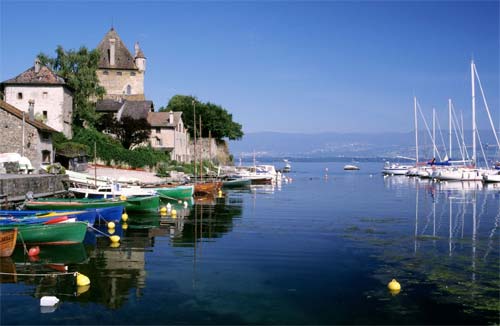Yvoire's garden by the lake
Ray Kershaw soaks up the joys of waterside life on the banks of Lac Leman

Yvoire's ramparts at sunset appear incandescent. An incoming fishing boat ripples the reflections in the vast inland sea. Above the town wall, golden spires glint like an alchemist's dream. Not a car breaks the spell. Surrounded by roses, a smiling old lady sits stroking her cat. Outside lakeside taverns men are drinking beer. Could this be truly one of France's busiest ports? For a camera-grabbing moment, Yvoire pulls off its old illusion of being the place that time forgot.
This is modern mainland France - a tricolore flies from the fortified gate - but the Chablais region, squeezed by the Alps and hemmed by international waters, still has the air of a Gallic island colony. Called the Garden of Geneva, the region's 50km of Lake Geneva shore - here called Lac Leman - rolls lushly back towards the mountains where châteaux and vineyards share the sunny slopes with meadows filled with dairy cows.
The Chablais has been French for just a century and a half. A vital corridor between northern and southern Europe, from the 10th to the 19th centuries its turbulent history chronicled the fortunes of the Duchy of Savoy. Founded in 1034 by Count Humbert the White Handed, from 1536 (when Protestant troops invaded from Geneva) it repeatedly changed hands for the next 200 years. For a century it was part of the Kingdom of Sardinia. In 1860, the Savoyards, fed up with absent landlords, elected for permanent union with France. But still today in Yvoire, built in 1308 as the duchy's western bastion, old loyalties ensure that the flag of the republic is outnumbered by the white cross on scarlet of Savoy.
Exploring Yvoire is like stepping back six centuries. No two houses are alike, but all look freshly minted for a fairy-story film set. Every stone, every timber, is indisputably real, and yet were the Middle Ages so florally spruce? The longer I saunter, the more the suspicion grows that the enchanting village may be a beautiful deceit.
Yvoire's official population - now just 432 - is served by five hotels, 17 restaurants and scores of souvenir and craftsmen's boutiques. Not a butcher or a baker or a proper shop remains. Twice a week, a travelling grocer toots his horn outside the church. The old ladies in the queue look like refugees from another age, but by lunchtime the cafes and restaurants are heaving. Where has everyone come from? Down by the picturesque harbour I finally realise that Yvoire may possibly be France's worst-kept secret.
Half a million passengers disembark here every year. Most are Swiss tourists or employees of Geneva's many international agencies. It's a popular trip on which to take visiting relatives and political patrons. You hear the jingle of expense accounts; you see some very flashy clothes.
At the end of every alley shimmers Lake Geneva. This vast tract of water is plied by the fleet of the Compagnie Generale de Navigation sur le Lac Leman. Four of its fleet are lovingly preserved antique steam paddle boats. From Yvoire you can cruise to Lausanne and Montreux. The shortest trip crosses to the walled Swiss town of Nyon.
The lake's reservoir of summer heat stretches the bathing season far into autumn, creating a kind of Alpine Riviera. Outside Yvoire's walls are marinas, beaches and promenades, where watching lakeside life from cafes can take up half a day. When the lake looks like silk it is hard to imagine the terrible storms that can make it resemble the North Sea in winter. Yvoire's lifeboat, La Chablaisienne, often puts out. Its most dramatic rescue was in 1970, when a freak wave tore into a tourist ship, drowning seven passengers.
A 14th-century chateau, the d'Yvoire family home since 1655, rises directly from the lake. In 1986, Yves and Anne-Monique d'Yvoire created their Garden of the Five Senses, which now attracts 600,000 visitors annually. I was prepared for something grandiose, but gradually began to grasp that understatement is its point. Enclosed by medieval walls, the gardens are linked by a labyrinth of hedges. The Garden of Sound gurgles with cascades. The Garden of Scents is heady with fragrance. There is the Garden of Colour; the Garden of Touch; the Garden of Taste, where every plant is edible. Flower-filled Yvoire has won France's top floral village award so often, it is now classified as hors concours - excluded by pre-eminence from competing again.
Not far up lake are the two Chablais spa towns, Evian and Thonon, although my happiest discovery was tiny Mernier, a village just around the headland. As ancient as Yvoire, it has a fraction of the tourists, a couple of restaurants and a grocer's selling Chablais cheeses, as well as many Savoy wines. These are rarely seen outside the region; from Abymes to Seyssel they called for serious research. My favourite was Crepy, happily also Yvoire's local tipple.
At the rustic La Poterne, Yvoire's oldest restaurant, Geneva cognoscenti mingle with the natives. Here, I drink Crepy and eat fish from the lake. Yvoire retains a small fishing fleet that lands many weird but wonderful freshwater varieties. The most expensive, fera, resembles wild salmon, but two nights running I gorge on the fishermen's favourites: mountains of crunchy matchstick sized fried smelt, followed by fried perch served with lemon butter sauce. With the day tourists gone, Yvoire's alleys are deserted except for prowling cats. Far across the lake, the lights of Nyon twinkle. The only sound is of the waves.
Garden of the Five Senses ( www.jardin5sens.net). Admission: adults €9 (£7.50)
Lake cruises: Compagnie Generale de Navigation sur le Lac Leman ( www.cgn.ch; 00 41 848 811 848).
For more information, see www.yvoiretourism.com,or call 0033 450 728 021
Join our commenting forum
Join thought-provoking conversations, follow other Independent readers and see their replies
Comments
Bookmark popover
Removed from bookmarks